
Blooming Mind Press

30 Creative Writing Prompts for People Living With Mental Illness
Written by Hannah Blum , author of The Truth About Broken: The Unfixed Version of Self-Love
I believe writing is one of the best ways to express yourself, especially when you live with mental illness. However, it’s hard to know where to start, which is why I have written creative prompts crafted for those of you living with mental illness. Some require more time, and this isn’t something you should do all in one sitting. Spread it out, and make it a journey. Grab your pen, do not overthink, and start sharing your truth about life with mental illness.
If you could explain to someone what it feels like to live with mental illness, what would you say?
Read the following quote, and express your interpretation of it and how it relates to your life with mental illness. It’s feeling full of everything and empty of it all at the same time. This is mental illness.
Write down something you have learned about the history of mental illness and stigma. I encourage you to research online and come back to this prompt. I have listed some resources at the bottom of this blog post. For example, In my research about Bedlam Asylum in the 14th Century, as means of raising hospital income, it was allowed public and casual visitors with no connection to the inmates to watch patients displayed in cages.
Write one chapter of your story.
Read the following quote, and express your interpretation of it and how it relates to your life with mental illness. When you live with a mental illness you spend most of your time “trying to explain” over taking care of yourself.
What does self-love mean to you?
What do you want society to know about those of us living with mental illness?
What is making you feel anxious right now and why?
What has been the toughest part about living with mental illness?
Read the following quote, and express your interpretation of it and how it relates to your life with mental illness. It was when I was lost that I suddenly felt found.
Write down your favorite book and why it meant so much to you.
Write down your biggest source of inspiration.
If you have a passion for any form of art, how do your emotions contribute to your art or writings, photography or any piece of content?
If you could tell a psychiatrist and psychologist how you want to be treated and what you want from them, what would you say?
What struggles are you facing right now?
Someone, who lives without a mental illness, asks you, “How can I be supportive to my friend with mental illness?” Write down your response
Write what you love about yourself.
What has your mental illness taught you about life?
How do you want to get involved with the mental health community?
Why do you think there is so much stigma in society and how can we reduce it?
Read the following quote, and express your interpretation of it and how it relates to your life with mental illness. The mental health problem is not just a health crisis, it’s a social injustice. It’s the mistreatment of the misunderstood.
Those of us living with mental illness struggle with self-love. Why is that? Write down how you think we can improve our self-perception.
How has stigma affected your life?
If you could make change in the mental health care system, what would it be?
Write a fictional story that explains mental illness.
What is one thing you can do that will help you get to where you want to go?
Write down 5 steps you can take that will help you improve your confidence.
In your own words, write an affirmation for you to recite each morning to yourself.
Free Write. Write whatever comes to your mind. Doesn’t matter if it makes sense or not. We can make sense out of nonsense.
Historical references:
Mental Health: Tracing The Stigma of Mental Illness
A Brief History of Mental Illness
Bedlam Asylum History
I hope you enjoyed this post. For more content follow me on Instagram.
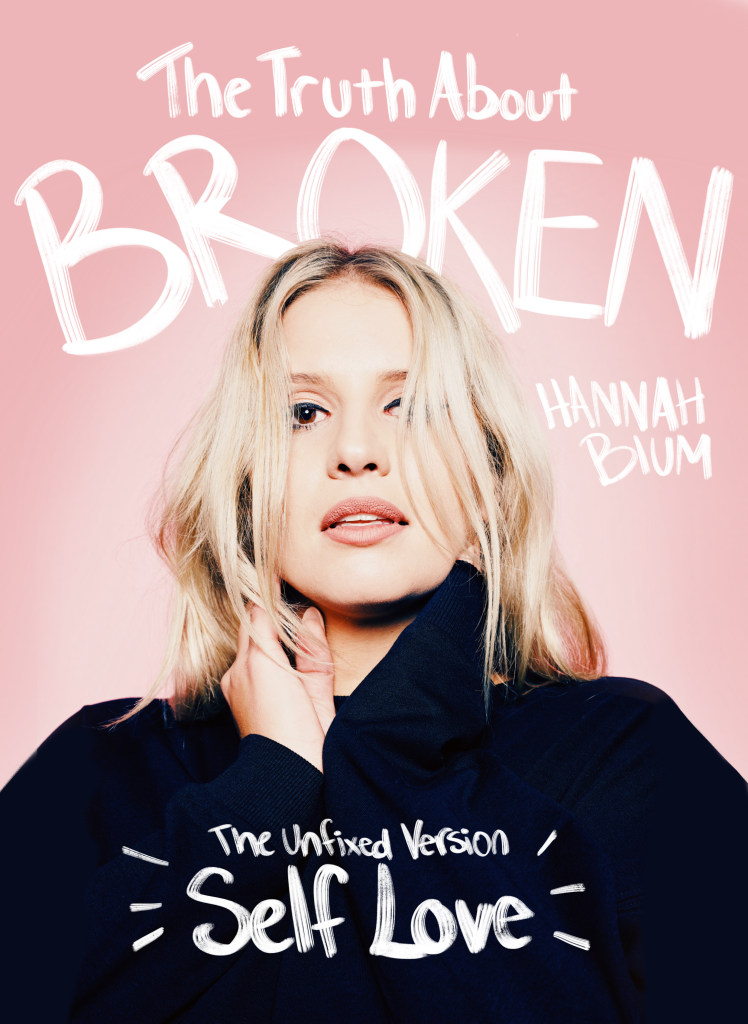
At the age of 20, Hannah Blum went from Prom Queen to a mental patient in the blink of an eye, but what she believed would be the end was only just the beginning. In her first book, The Truth About Broken: The Unfixed Version of Self-Love , Hannah Blum redefines what it means to love yourself and takes readers on an unforgettable journey towards embracing what makes them different.
Copyright: The quotes used in this blog post are the original work of Hannah Blum.
Share this:
One thought on “30 creative writing prompts for people living with mental illness”.
- Pingback: 11 Ways of Coping With Your Mental Health During the Coronavirus Pandemic – Halfway2Hannah
Leave a comment Cancel reply

- Already have a WordPress.com account? Log in now.
- Subscribe Subscribed
- Copy shortlink
- Report this content
- View post in Reader
- Manage subscriptions
- Collapse this bar
Username or Email Address
Remember Me Forgot Password?
Get New Password
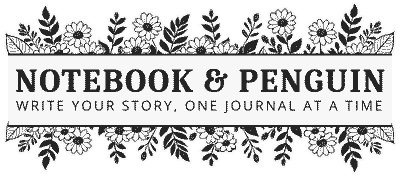
65 Essential Mental Health Journal Prompts For Adults And Teens
- Journaling , Journaling Prompts
If you are anything like me then your mind can be a pretty noisy place and sometimes it can be hard to process all those thoughts and emotions swirling around and around in your head!
Journaling is a great way to help quiet that inner chatter and it gives you a great way to explore your deeper thoughts and feelings in a comfortable way. Sometimes the simple physical act of writing can help us to gain clarity and help us unpack our feelings all while making sense of the chaos that seems to rule our minds.
In this article, you will find a collection of journal prompts for mental health. Each prompt is designed to help you check in with yourself and explore your deeper experiences, feelings, and emotions. I hope that they will help you to work through your challenges and help improve your overall well-being!
If you enjoy using these prompts, please consider pinning them! We would appreciate it 🙂
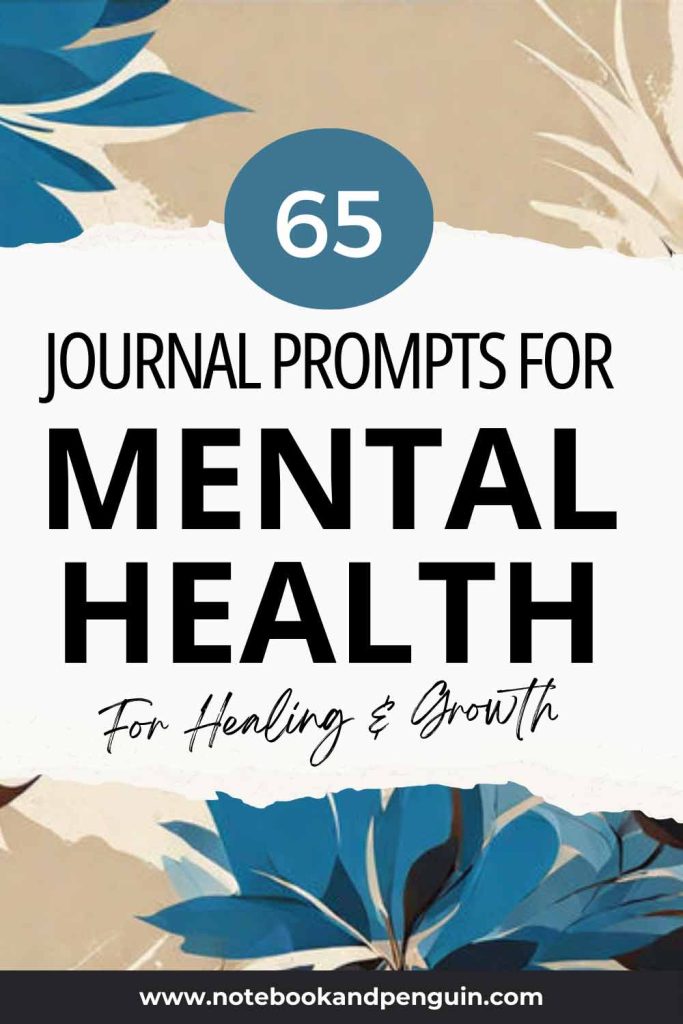
Understanding and Acknowledging Emotions
- What are you feeling right now, and where do you feel it in your body? How do you think this feeling affects your mental health?
- Describe a recent situation that triggered feelings of anxiety, depression, or helplessness. What happened, and how did you react?
- What are some common thoughts that run through your mind when you’re feeling anxious, depressed, or helpless?
- How do you typically cope with difficult emotions? Is there a pattern you’d like to change?
- What would you say to a friend who was experiencing mental health challenges or who is feeling the same way you are right now?
- What’s one emotion you’ve been trying to avoid or suppress? What’s the underlying fear or concern behind it?
- How do you know when you’re feeling overwhelmed? What are the physical, emotional, or mental signs?
- What’s one thing you can do to acknowledge and validate your emotions, rather than trying to push them away?
- What’s the most challenging emotion for you to deal with, and why? What would you need to feel more comfortable with it?
- Are there any emotions you’ve been taught to suppress or hide growing up? How has that impacted your emotional well-being?
Identifying Triggers and Patterns
- What are some common triggers for your anxiety, anger, depression, helplessness, etc.? (e.g., people, situations, thoughts)
- Are there any patterns you’ve noticed in your emotions or behaviors? (e.g., time of day, certain activities). How do these patterns affect your mental health?
- How do you react when you feel overwhelmed? What do you do, and what do you wish you could do instead?
- What are some negative self-talk patterns you’ve noticed? How can you challenge them?
- Are there any unhealthy coping mechanisms you use? What would you like to replace them with?
- What’s one situation or event that consistently triggers strong emotions in you? What’s the underlying fear or concern behind it?
- Do you notice any patterns in your relationships that contribute to negative feelings? (e.g., people-pleasing, avoidance)
- How does your environment impact your emotions? Are there any specific spaces or settings that trigger certain feelings and how do these places affect your mental health?
- What’s one thought pattern or belief that you’ve noticed is linked to feelings of anger, anxiety, depression, etc? Is there evidence to support or challenge it?
- Are there any physical sensations or symptoms that precede feelings of anxiety or any other emotions? (e.g., tension, fatigue)
Learn More About Yourself And Your Inner World By Exploring Your Shadow Self Through Shadow Work .
Building Self-Awareness and Compassion
- What are some things you’re proud of accomplishing, no matter how small they may seem?
- What are some things you’re grateful for about yourself? (e.g., strengths, skills, qualities)
- How can you practice self-compassion when you make mistakes or have setbacks?
- What would you do differently if you knew you were worthy of love and respect, regardless of your flaws?
- What’s one thing you’ve been too hard on yourself about? How can you offer yourself kindness and understanding instead?
- What are some positive affirmations you can use to counteract negative self-talk? How can you incorporate them into your daily routine?
- How do you typically talk to yourself when you’re struggling? Is there a more compassionate way you could reframe your inner dialogue?
- What’s one thing you can do to celebrate your uniqueness and individuality?
- What would you say to a friend struggling with self-doubt or low self-esteem? How can you offer yourself the same kindness and support?
Remember to take care of yourself while you journal. Check out our collection of self-love journaling prompts that will help you explore all the beautiful parts of yourself!
Overcoming Indecision and Helplessness
- What’s one decision you’ve been putting off, and what’s holding you back from making it?
- What are the potential consequences of not making a decision? What are the benefits of taking action?
- What’s one small step you can take towards making a decision or taking action?
- What would you do if you knew you couldn’t fail? What would you attempt?
- What’s one thing you can control in a situation that feels overwhelming?
- How can you break down a seemingly insurmountable task into smaller, manageable steps?
- What’s one thing you can do to take care of yourself when you’re feeling overwhelmed or helpless?
- What’s one area of your life where you feel stuck, and what’s one potential solution or next step?
- How can you reframe “I don’t know what to do” to “What are my options, and what’s the next step I can take?”
- What’s one thing you can do to build momentum and motivation when you’re feeling stuck?
- How can you practice self-advocacy and assertiveness in a situation where you feel helpless?
- What’s one thing you can do to celebrate your small wins and build confidence in your decision-making abilities?
Cultivating Gratitude and Positivity
- What are three things you’re grateful for today? Why are they important to you?
- What’s something you’re looking forward to in the coming days or weeks?
- What’s one positive thing you can say about yourself or your life right now?
- What would you do if you had unlimited resources and support? What would you create or achieve?
- What’s something you’ve accomplished that you can build upon to create more positive momentum?
- What’s one thing you can do today to bring joy or positivity into your life?
- What’s one thing you’re proud of accomplishing in the past year? How did it make you feel?
- What are some things you’re grateful for about your body or physical health?
- How can you practice mindfulness and presence to appreciate the small pleasures in life?
- What’s one positive affirmation or mantra you can use to start your day on a positive note?
- What’s one thing you can do to show appreciation or gratitude to someone else today?
Need more gratitude journal prompts? Check out this collection: Giant List Of Over 300 Gratitude Journal Prompts!
Building a Positive Future
- What’s one thing you’d like to achieve in the next month? What steps can you take to make it happen?
- What’s something you’ve always wanted to try but have been too afraid to attempt? What’s holding you back?
- What’s one positive habit you’d like to develop, and how can you start incorporating it into your daily routine?
- What’s your vision for your ideal life? What steps can you take to move closer to it?
- What’s one thing you can do today to move closer to your long-term goals?
Mindfulness and Self-Care
- What’s one thing you can do to take care of your physical health today? (e.g., exercise, healthy eating)
- What’s one thing you can do to relax and reduce stress? (e.g., meditation, deep breathing)
- What’s one thing you can do to nourish your mind and spirit? (e.g., reading, spending time in nature)
- What’s one self-care activity you’ve been putting off, and how can you prioritize it?
- What’s one thing you can do to create a sense of calm and tranquility in your environment?
- What’s one thing you can do to create a peaceful and calming environment in your home or workspace?
- How can you prioritize self-compassion and kindness when you’re feeling overwhelmed or struggling with difficult emotions?
- What’s one thing you can do to connect with nature and the world around you, and how can that bring you a sense of calm and well-being?
Reframing Negative Thoughts and Emotions
- What’s one negative thought pattern you’d like to challenge? What’s a more balanced or positive way to think about it?
- What’s one emotion you’ve been trying to avoid or suppress? What would happen if you allowed yourself to feel it?
- What’s one situation where you felt anxious or depressed, but what if you looked at it from a different perspective?
- What’s one thing you can do to reframe a negative experience as an opportunity for growth?
- What’s one way you can practice forgiveness, whether it’s towards yourself or others?
Building Resilience and Confidence
- What’s one thing you’ve overcome in the past? What strengths did you use to get through it?
- What’s one thing you’re proud of accomplishing, even if it was difficult or challenging?
- What’s one way you can build your confidence in a specific area of your life?
- What’s one thing you can do to develop a growth mindset, rather than a fixed mindset?
- What’s one way you can celebrate your successes, no matter how small they may seem?
Moving Forward and Letting Go
- What’s one thing you’re holding onto that’s no longer serving you? What would happen if you let it go?
- What’s one thing you’re willing to release or forgive yourself for?
- What’s one thing you can do to create a sense of closure or completion in a difficult situation?
- What’s one way you can focus on the present moment, rather than dwelling on the past or worrying about the future?
- What’s one thing you’re excited to create or achieve in the next chapter of your life?
- What’s one step you can take to move forward from a place of fear or uncertainty?
- What’s one thing you’re willing to let go of in order to make space for something new and positive in your life?
- How can you practice forgiveness, not for someone else’s sake, but for your own?
- What’s one thing you can do to release the need for control or perfection in a particular area of your life?
- What’s one way you can honor your past experiences and emotions while still moving forward in a positive direction?
- What’s one thing you can do to create a sense of closure or completion around a difficult relationship or dynamic?
Final Thoughts
There you have it! A collection of over 50 journal prompts for mental health! Remember that these prompts are generic prompts that you can modify based on your own needs and experiences.
Don’t forget to be honest and kind to yourself as you journal and don’t worry if you miss a day or two as you work on your mental health. The goal is to make progress, not to be perfect! And, if you would like more journaling prompts once you have completed these, then don’t forget to check out our journal prompt library !
Leave a Reply Cancel Reply
Your email address will not be published. Required fields are marked *
Name *
Email *
Save my name, email, and website in this browser for the next time I comment.
Post Comment
Related Posts

How To Start Journaling: The Best Journal Writing Guide For Beginners

110 Manifestation Affirmations to Help You Attract Abundance and Success

15 Amazing Advantages & Benefits Of Keeping A Journal

50+ Best Therapeutic Journal Writing Prompts for Mental Health
Share because you Care!
Journal therapy involves the therapeutic use of a journaling practice to bring about awareness and improve mental health. The biggest difference in therapeutic journaling from just keeping a personal journal is therapeutic journaling focuses more on thoughts, feelings, and insights.
By being intentional about your writing, you can identify areas where you are struggling and start implementing change, whether you struggle with mental health conditions such as anxiety, depression, or even just the use of cognitive distortions .
The therapeutic benefits of keeping a mental health journal can be endless.
Here are 7 therapeutic benefits of keeping a mental health journal [affiliate].
As well as 53 journal prompts that will help get you started, so you hopefully do not find yourself staring at a blank page trying to figure out where to start.

Mental clarity through journaling
Especially as we get older, time tends to fly right past us. And sometimes, it feels like it is flying by so quickly that we barely get a chance to process it. Before the next barrage of thoughts and feelings show up. And this is where journaling can come in.

Journaling helps us slow down for a few minutes to get some clarity in our lives. Because sometimes, we find ourselves trapped in patterns of thoughts and behaviors that do not make much sense to us. At least at the time. By keeping a journal, we can get some clarity in our lives and identify those thoughts, feelings, and patterns.
That without journaling, we might not have been able to identify. With journaling, we can get a different perspective on our thoughts, feelings, and behaviors and a chance to learn from them. What inspires and motivates us. And what we shy away from out of discomfort or fear.
Journaling offers the opportunity to observe our lives from a third-party perspective and track our decision-making processes and the consequences of those decisions. So hopefully, over time, we can make new or better decisions.
Patterns in thoughts and feelings
Do you ever find yourself engaging in patterns of thoughts and feelings? While journaling helps us build a stronger connection with our thoughts and feelings. By offering a space where you can write openly and honestly. And helps us to sort through why we are thinking and feeling how we are thinking and feeling.
So, while the pages of your journal give you the space to write openly and honestly, it should not become the place where you spiral into hopeless despair, sometimes also referred to as the rabbit hole.
Finding self-love through positive self-talk – Internal Dialogue that keeps you Stuck
Instead, the purpose of a journal should be a place where you can reflect on the patterns that emerge. And either uncover where they are coming from or form a plan to address or challenge those thoughts and feelings moving forward.
How you talk to yourself about yourself (the inner critic)
We all experience internal thoughts and have some form of internal dialogue. Some people have a fairly healthy internal dialogue, and for others, they have an unhealthy internal dialogue. Some folks are pretty aware of their internal dialogue, and others are not. Whether you are fairly aware or unaware, journaling can help you gain better awareness.
17 Common Cognitive Distortions
The way we talk to ourselves influences our levels of happiness and success. But, unfortunately, it also influences our levels of unhappiness and lack of success. Your internal dialogue can be your greatest enemy or your most powerful ally, depending on how you use it. You can’t control every thought that comes into your head because we have automatic thoughts. These are the thoughts that come unbidden and suddenly pop up. However, you can control your second thought and all of the thoughts that come after it.
11 Powerful Growth Mindset Journal Prompts (Limiting Beliefs & Inner Critic)
Journaling can be the space that you need to record your automatic thoughts. This can help you create an awareness of how you talk to yourself and even the tones you talk to yourself.
Journaling can also be a safe space where you can begin to make changes in your internal dialogue and tone. At the very least, you can begin to recognize when you have an unhelpful automatic thought and begin to change how you are thinking consciously.
Journaling creates the space and opportunity to intentionally change how you think by getting those thoughts on paper. It offers you the distance and the perspective that you need to look at these thoughts, written by your own hand and in your own words.
Self-talk is far too powerful to be lazy with. And with journaling, you can perhaps gain the awareness that you need to consciously take control over how you talk to yourself about yourself.

Helps you visualize the changes you want to make
Journaling provides an outlet and helps you visualize where you want to go. One of the many benefits of journaling is it gives you an outlet for your thoughts and emotions. In addition, journaling provides you with space where you can express yourself honestly.
You can begin to break down the things you are struggling with into smaller pieces that feel less overwhelming; journaling offers an efficient solution, problem-solving.
By reading over previous journal entries, you may begin to see a pattern emerge. This pattern can be a great way to discover where you need to implement changes, even if they are just little things or small new habits that create change.
Your small wins, insight, and inspiration
As a mental health therapist, I see folks struggle with this all the time. I have folks that come to me each week with a laundry list of all the things that didn’t go right since the previous week. This then becomes a self-fulfilling prophecy.
If you are walking around with an unhealthy internal dialogue and are only acknowledging (consciously or unconsciously) the negatives in your life, you are almost setting things up to guarantee a fail. But, on the other hand, when you focus exclusively on the negatives, it becomes a way to support your hypothesis and internal dialogue.
So if your hypothesis and internal dialogue are “I’m a failure,” and all of your focus is on the things that are not going right or going well. There is almost a satisfaction in finding evidence to support your hypothesis and internal dialogue.
Dangers of Perfectionism vs. Excellence (Overwhelming Anxiety vs. Healthy Striving)
Because out of all the things in life that we cannot control, at least you feel that you can control this. The hypothesis and internal dialogue of “I’m a failure” becomes the one area of your life you feel you can control.
But by journaling about your small wins, insights, and moments of inspiration, you can begin to challenge your hypothesis and internal dialogue. By focusing on the wins, insights, and inspirations, you begin to shift your negative mood states and cognitions. By making this shift, you can begin to move towards whatever your goals or aspirations are.
Self-reflection a new perspective
Through journaling, you can begin to do some self-reflective work. You can identify your beliefs, morals, and values. And you can also begin to identify your limiting beliefs too. So often, our “I can’t… because I’m not…” statements that we say to ourselves keep us stuck.
By using a journal as a space for self-reflection, you can begin to discover where your beliefs, morals, and values, as well as your limiting beliefs, come from. We often inherit these things from our primary caregivers, and they are passed down through the generations. And through journaling, you can begin to discover where you have learned these things, especially when it comes to the limiting beliefs that we so often want to change.
And it is through moments of self-reflection, we can gain the perspectives that we need to decide if we want to change something that we have held onto. So through the act of journaling, you can begin to recognize the themes that are coming up for you. And through journaling, you can reflect on what you want to change to have the life you want to have.
101 Self-Care Journaling Prompts for better Mental Health.
Your personal growth
Have you ever stopped and looked at your life and wondered how you got to where you are? Life happens so quickly that we rarely get the opportunity to stop and reflect on our life. We rarely stop to contemplate how far we have come. So often feel like we are chasing (a potentially unknown) destination, and we don’t know how we have gotten here. And journaling gives us an amazing gift. It tracks your personal growth and the decisions that have led you to where you are now.
But what if you are at a destination you don’t want to be at or remain at longer than necessary? This is another gift that journaling offers you. The opportunity to look back at your decisions and make new different decisions. It makes me think of a fairly common saying. You don’t know what you don’t know.
And if you find yourself in a part of your life and don’t know how you have gotten there, this is where journaling can come in handy. Whether you have entries that you can refer back to, or if you’re starting with journaling, you can begin to discover and document the things that you didn’t know.
How to Love Yourself: 27 Self-Love tips from a Therapist
Human beings, for the most part, are pleasure-seeking creatures. Therefore, we tend to avoid things that cause us pain or discomfort or what we think will cause increased pain or discomfort.
So we choose the lesser of the two. But sometimes, to experience personal growth, we have to lean into the discomfort. And sometimes, we have to read and reread our stories to find those opportunities for personal growth.
Here is a list of 56 journaling prompts for therapeutic journaling. I have broken down this list of journal prompts into categories to help get you started.

10 Therapeutic journaling prompts for a bad day
- Describe your day and what about it is bothering you. What were you thinking and feeling?
- What are some helpful things to tell yourself on difficult days?
- Did you have any negative thoughts today, and how can you reframe them to be more helpful?
- Make a list of things that you are grateful for.
- If a day like today happens again, what are some helpful ways for you to get through it? If you can control it, what do you need to do differently? And if you can’t control it, how can you begin to accept it?
- Reflect on the last time you had a bad day. What were some helpful things that you said or did to get through it?
- Make a list of self-care ideas you can do when struggling.
- Research and write about managing anxious thoughts when you have them.
- What are three important things that you can remind yourself of when you struggle with negative emotions?
- What have past experiences taught you about your resiliency? And what can this experience teach you moving forward?

28 Therapeutic journaling prompts for self-reflection
- How can you encourage yourself to get out of your comfort zone?
- What are some things that you need to remind yourself of when you are having a hard time shifting your mindset?
- If you could travel back in time, what would you tell your teenage self that would help you now?
- What are 3 things that your best friends would say that you do well? And what are 3 things that your best friends would say that you struggle with? What do you need to do to begin to work on those things?
- If you were to have a perfect day, what would you be thinking and feeling? And how do your thoughts and feelings influence your day?
- What new habits or daily routine can you implement to empower you?
- Are there boundaries that you need to set with yourself or others, and if so, what is the first thing that you need to do?
- How do you set boundaries and avoid absorbing other people’s stuff?
- How do you know when you are nearing burnout, and what mental health issues do you experience?
- What does your authentic self look like?
- How do you remind yourself that you are enough even when you have a tough time or a difficult experience?
- What are 3-5 things that you need in that present moment when you are struggling?
- What new opportunities have come out of the challenges that you have faced?
- How do you calm your anxiety when you are experiencing difficult times?
- When you get on social media, what is it that you are looking for and why?
- What is your personal definition of success? And do you have any limiting beliefs that are holding you back?
- What are your priorities for next year? And are you actively or passively working towards them?
- Write about a failure you have experienced. How did you experience it emotionally? What did you say to yourself as you were experiencing it? And what do you want to remind yourself the next time you experience failure?
- What are some good things about experiencing failure?
- Make a list of all of the things you would like to say ‘NO,’ too. How many of these things are you currently doing?
- Make a list of all of the things you would like to say ‘YES,’ too. How many of these things are you currently doing?
- What personal goal am I working towards? And how will I know when I get there?
- If I wrote a letter to my younger self, what would it say?
- What if you wrote a letter of forgiveness to yourself? What would it say?
- A defining moment in my life was…
- If you were guaranteed success, what would you be doing? And how can you begin to work towards it?
- If you were guaranteed that today was the perfect time to do something, what would you do?
- What does unconditional love look like for you?

18 Therapeutic journaling prompts for self-care
- What have you done lately for yourself, even if they are just a few small things? And if you haven’t, what are a few small things you could start doing?
- When you take the time to care for yourself, what mental health benefits do you experience?
- What does your self-care routine look like now, and are there any changes you need to make? If so, what are they?
- When you think about your morning routine, what is one thing that you would like to adjust that would help you take better care of yourself?
- Are there any adjustments you would like to make to your evening routine to take better care of yourself? And if so, what adjustments would you make?
- When I’m swamped, how can I find 10 minutes for myself? And what is something I can do during that time?
- What are some things I can do to prioritize my physical health, and how can I implement them?
- After a long day, the kindest thing that I can do for myself is…
- If you were to make a self-care box, what kinds of things would you add to it and why?
- How well have you been taking care of yourself the last couple of years? Are there things you need to keep doing, and are there things you need to change?
- Research some new ideas to implement into your self-care routine if you feel stuck.
- What acts of self-care truly make me happy, and how can I add more of these into my day?
- Am I sacrificing personal needs to make others happy, and what are those sacrifices?
- How do I advocate for myself? And what is at least 1 healthy thing that I can do to advocate for myself?
- What is my own experience around forgiveness?
- What do I need most to heal right now from a difficult situation?
- If you were to give yourself the best compliment ever, what would it be and why?
- What is your favorite memory? And how can you make more memories like this moving forward?
Final Thoughts
While therapeutic journaling has many benefits and is a positive way to help improve your emotional state. It may not be beneficial to process through traumatic experiences or significant mental illness on your own. And would be best used in conjunction with seeing a licensed mental health professional.
If you’re interested in starting therapy and would like to do it from the comfort of your own home, then take a look at Online-Therapy.com , and if you use my link [affiliate link]. You’ll receive a 20% discount on your first month at no additional cost to you.
I have been affiliated with online therapy platforms for over a year now and have had the privilege to work with a lot of folks on various life struggles. That without the ease of online platforms might not have ever reached out for help.
So if you’re struggling and feel that therapy would be helpful, then I encourage you to give it a try. Because who knows where you might be in a few months down the road. And I’m guessing if you’re reading this article it’s because you’re not where you want to be.
How to protect yourself from [Emotional] Vampires
Leave a Comment Cancel Reply
Your email address will not be published. Required fields are marked *
Save my name, email, and website in this browser for the next time I comment.
150 Journaling Prompts for Mental Health: A Comprehensive Guide to Mindful Expression
Discover 150 transformative journaling prompts designed to enhance your mental health through mindful expression. Unlock a path to self-discovery and emotional healing. Read on to find out more.

Journaling for mental health is a journey of self-exploration, a path that leads towards understanding and healing. It involves expressing thoughts and feelings on paper (or digitally) to process emotions, reduce stress, and gain clarity. However, staring at a blank page waiting for inspiration to strike can be intimidating. That's where journaling prompts come in handy. They serve as a starting point, nudging your thoughts and encouraging reflection. In this post, we'll explore some thoughtful journaling prompts designed to foster mental well-being and how integrating these prompts with the Journey can enhance your journaling experience.
Why Use Journaling Prompts?
Prompts can help overcome the initial hurdle of starting your journal entry. They guide your focus and encourage a deeper dive into your feelings, thoughts, and experiences. For someone journaling for mental health, prompts ensure that the process remains constructive, leading to insightful revelations and personal growth. They transform journaling into a guided exploration of your inner landscape, making the practice more approachable and rewarding.
150 Journaling Prompts for Mental Health
Here are some prompts designed to target various aspects of mental health. They aim to unlock emotions, foster positivity, encourage mindfulness, and facilitate self-discovery.
Understanding Emotions

- What emotion have I felt most strongly today? Why?
- Describe a time recently when you felt unexpectedly emotional.
- What situations make me feel anxious? Are there patterns?
- Write about a moment you felt incredibly happy. What sparked it?
- How do I react when I am angry? How can I respond better?
- When was the last time I felt surprised by my own actions?
- Describe a recent situation where you felt disappointed. How did you cope?
- What does sadness feel like to me? Are there physical sensations?
- How do I feel right now, in this moment?
- Reflect on a time when your mood changed rapidly. What caused it?
Self-Exploration

- List 5 qualities you admire about yourself and why.
- What are my biggest fears, and what do they say about me?
- Describe your ideal day. What makes it perfect?
- What are my strongest beliefs? Have they changed over time?
- Where do I feel safest? Why?
- What parts of my life do I want to improve? How might I do that?
- In what ways have I changed in the past year?
- What am I most proud of? Why?
- What does happiness mean to me?
- What are my goals for the next year? Five years?
Relating to Others
- Describe a relationship that has had a significant impact on you.
- How does social interaction affect my mood and energy?
- Write about a time you felt misunderstood.
- How do I express love? How do I prefer to receive it?
- How can I strengthen my relationships with loved ones?
- What am I looking for in a friendship?
- Reflect on a difficult conversation you’ve had recently. How was it resolved?
- What boundaries do I need to set or enforce in my relationships?
- In what ways can I become a better listener?
- How does my environment (people, places) affect my mental health?
Coping and Healing

- What activities help me relax and feel more at peace?
- Write about a difficult experience and how you overcame it.
- What does self-care look like for me? Am I practicing it enough?
- How do I handle stress? What can I improve?
- Reflect on a past mistake. What did it teach you?
- What are my coping mechanisms when feeling low? Are they healthy?
- How do I deal with loss and grief?
- Describe a time you forgave someone. How did it feel?
- What makes me feel powerful and in control?
- How do I want to grow from my current struggles?
Dreams and Aspirations

- What is my biggest dream? What steps am I taking towards it?
- If I had no fear, what would I do differently in my life?
- Where do I see myself in 10 years? What am I doing?
- What skill do I want to learn? Why?
- Describe your perfect job. What makes it ideal?
- What do I want my legacy to be?
- If money were no object, what would I spend my life doing?
- What destinations are on my travel bucket list? Why?
- What does success look like to me?
- Write about a cause you're passionate about. How can you contribute?

Reflections on the Day

- What made me smile today?
- Did I learn something new today? What was it?
- What am I grateful for today?
- Was there a moment today when I could have reacted better? How?
- Describe a new idea or inspiration that struck today.
- How did I take care of my mental health today?
- Did I engage in any self-sabotage today? How can I prevent it?
- How did today’s experiences align with my long-term goals?
- What challenged me today? How did I handle it?
- Write a letter to your future self about today.
Daily Practices and Habits
- What habit do I want to develop for my mental health?
- How does my morning routine affect my mood for the day?
- What nighttime routine helps prepare me for a good night's sleep?
- How does my diet impact my mental health?
- What role does exercise play in my mental well-being?
- What is one small change I can make today for a healthier life?
- How do I balance work/school with relaxation?
- What does my ideal work/life balance look like?
- How do I deal with procrastination?
- Write about a time when changing a habit significantly impacted your life.
Gratitude and Positivity

- List 10 things I am grateful for in my life and why.
- How can I introduce more positivity into my daily life?
- Write about someone who has positively influenced your life.
- What small joys can I find in everyday life?
- How does practicing gratitude affect my mental state?
- Reflect on a happy memory that always makes you smile.
- What are some positive affirmations that resonate with me?
- How can I spread kindness today?
- What beauty do I see in the world around me?
- How do I overcome negative thoughts?
Challenges and Obstacles
- What is the biggest challenge I am facing right now?
- How can I approach my problems more creatively?
- Write about a time you turned a failure into a lesson.
- How do I motivate myself during difficult times?
- What fears are holding me back? How can I confront them?
- How do external factors (e.g., news, social media) affect my mood and thoughts?
- What do I do when I feel overwhelmed?
- How can I ask for help when I need it?
- What steps can I take to overcome a current obstacle?
- Reflect on a past hardship. How does it shape who you are today?
Mindfulness and Presence
- What mindfulness practices help me stay grounded?
- How can I become more present in everyday moments?
- Write about a time you felt completely at peace.
- How does nature impact my mental health?
- What activities help me get into a state of flow?
- How can I slow down in life and savor the moments?
- What does being present look like in my daily life?
- How does paying attention to my senses affect my mood?
- When do I feel most connected to myself?
- How does practicing presence change my interactions with others?
Self-Care and Wellness
- What is my definition of self-care?
- How can I prioritize my mental health this week?
- What are my non-negotiable self-care practices?
- Write about a time self-care made a significant difference in your day.
- How do I balance caring for myself with caring for others?
- What self-care habit would I like to explore?
- How does physical health contribute to my mental wellness?
- What self-care practices feel most luxurious to me? Why?
- When do I feel most taken care of? What or who makes me feel this way?
- What does self-love mean to me?
Achievements and Celebrations
- What achievements am I most proud of?
- How do I celebrate my successes, big and small?
- Write about a recent accomplishment and how it made you feel.
- What obstacles have I overcome that deserve recognition?
- How do I reward myself in healthy ways?
- Reflect on a journey that was difficult but worth it in the end.
- What are some qualities in myself that I feel proud of?
- How does celebrating my achievements impact my mental health?
- Who supports me in my achievements? How can I show my appreciation?
- What future achievements am I working towards?
Letting Go and Forgiveness

- What is something I need to let go of? Why?
- How can I practice forgiveness, both towards myself and others?
- Write about a time you forgave someone. How did it affect your relationship?
- What grudges am I holding onto? How do they serve me?
- How does holding onto the past affect my present and future?
- What steps can I take to release anger or resentment?
- Describe a situation where you showed yourself compassion and forgiveness.
- How can letting go of control improve my life?
- What fears am I ready to release? How will I do it?
- Reflect on a time when letting go led to peace and resolution.
Personal Growth and Development
- In what ways do I want to grow in the next year?
- How can I step out of my comfort zone more often?
- What new things do I want to try, and what's stopping me?
- How does personal growth impact my mental health?
- What lessons have I learned that I can apply moving forward?
- How can I be more open to change?
- What does personal development mean to me?
- How can I be kinder to myself during periods of growth?
- What strengths have I discovered in myself recently?
- What does progress look like in my journey of personal growth?
Reflections and Looking Back
- What were the most significant lessons from last year?
- How have my priorities changed over time?
- Reflect on a turning point in my life. What did I learn?
- How have my relationships evolved over the years?
- What past experiences continue to shape my present?
- What old habits have I successfully changed?
- How does reflecting on my past help me understand my present?
- What past achievements deserve more recognition?
- How have I dealt with changes in my life?
- What are the most valuable lessons I’ve learned from my experiences?
Integrating Prompts with the Journey App
The Journey app enhances the use of prompts by making them easily accessible and part of your daily journaling habit. Here’s how:
Customizable Prompts
By allowing users to curate a personal library of prompts, the Journey caters to a wide spectrum of needs and preferences. This customization enables users to focus on areas they find most beneficial, whether it's gratitude, self-reflection, problem-solving, or creativity. For instance, someone looking to improve their self-esteem might concentrate on prompts that encourage positive self-talk and accomplishments. The ability to cycle through different kinds of prompts ensures that users can keep their journaling practice fresh and engaging, avoiding monotony and encouraging consistent usage.
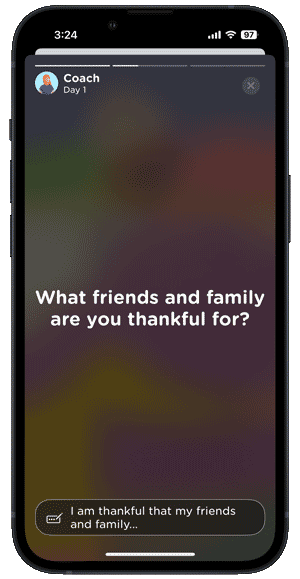
Daily Reminder
Life can get incredibly busy, and even with the best intentions, journaling might slip through the cracks of our daily routines. The integration of daily or weekly reminders specifically addresses this challenge. By not only reminding users to journal but by including a prompt directly in the reminder, the Journey significantly lowers the barrier to start writing. It removes the common obstacle of not knowing what to write about, making it more likely for users to engage with their journal regularly. This feature is particularly beneficial for individuals who are new to journaling or those who struggle with maintaining consistent habits.
Mood Tracking
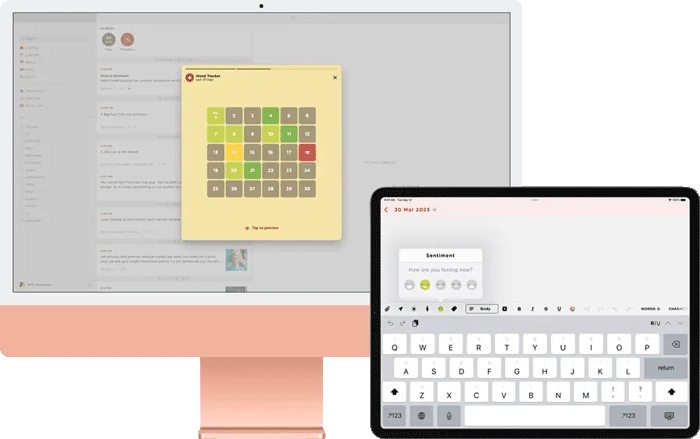
The incorporation of mood tracking alongside prompt-based journaling offers a powerful tool for self-awareness and emotional intelligence development. By recording their mood before and after journaling, users can observe patterns and draw connections between the themes of their prompts and their emotional responses. Over time, this can provide valuable insights into triggers and coping mechanisms, enhancing the user's ability to manage their emotional well-being proactively. For example, a user might discover that journaling about gratitude consistently improves their mood, suggesting a beneficial focus for future entries.
Journaling is a deeply personal and transformative practice, especially when guided by prompts that challenge you to confront, reflect, and grow. By integrating these prompts with tools like the Journey app, you empower yourself with structure and spontaneity, making each journaling session a step towards better mental health. Remember, the journey to self-discovery and healing is ongoing and ever-evolving, just like the pages of your journal.

Start your digital journal - download Journey app today!

Writing for Well-being: 50 Journaling Prompts for Mental Health
Sian Ferguson
Life often feels like an endless sprint filled with to-do lists that put your mental health on the back burner.
If this sounds all too familiar, and your mental health has taken a knock, it could be time for you to consider trying mental health journaling prompts. These prompts encourage you to explore and look after your most important asset — your mind.
In this article, we provide 50 prompts for mental health journaling .
Key Takeaways
- Mental health journaling prompts serve as tools for introspection, aiding in navigating through life's challenges and appreciating your mind.
- Unlike typical journaling prompts, mental health prompts delve deeper into personal experiences, promoting a better understanding and improvement of your mental well-being.
- Categorized journaling prompts help focus on varied life aspects such as stress reduction, gratitude, personal growth, and acceptance, aiding in a holistic approach to mental health.
- Journaling contributes to potential benefits like reduced stress, enhanced emotional processing, and improved decision-making.
- It also fosters a healthier mental state, positively impacting your relationships, daily life, and overall psychological well-being.
What Are Mental Health Journaling Prompts?
Journaling prompts are thought-provoking inquiries or suggestions that encourage introspection. In this context, mental health journaling prompts help you explore various parts of your life and their connection to your mental well-being.
If you've decided to start journaling but feel too overwhelmed to start, don't worry. "Blank page syndrome" is more common than you think.
That’s where journaling prompts come in. These prompts can make it easier to journal consistently and effectively. They can give you the gentle nudge you need to reflect, express, and process your feelings and experiences, helping you dig deeper into topics that matter.
Journaling Prompts for Mental Health
Self-reflection, mindfulness and overcoming obstacles.
Obstacles are a tricky but inevitable part of life. Reflecting on these challenges and learning from them can help you become more mindful of your thoughts and actions.
Reflect on the obstacles you’ve faced and how you’ve dealt with them using the following prompts:
- Describe a situation that made you feel happy recently. What was happening, who were you with, and how did you feel?
- Identify and reflect on a core value that drives your actions. How does this value manifest in your daily life?
- Describe a challenge you faced and how you overcame it. What did you learn from the experience?
- What are some everyday activities that you find meditative or grounding?
- Describe a situation where a positive attitude made a difference.
- Reflect on any limiting beliefs you hold. How can you challenge and reframe them?
- Practice a 5-minute mindfulness meditation, focusing on your breath. Write down any thoughts or feelings that arose during this time.
- Describe an obstacle you are currently facing. What steps can you take to overcome it?
- Reflect on a time you turned a negative situation into a positive one.
- List five resources or strategies that can help you overcome obstacles in your life.
Stress Reduction and Gratitude
If you’re feeling bogged down by stress, consider exploring what you’re grateful for. Studies suggest that gratitude-focused writing is a helpful method to reduce stress and the impact of stressful life events [1] .
Work through your stress and practice gratitude with the following prompts:
- Describe any stressors in your life and brainstorm solutions or coping strategies.
- What activities or practices help you relax and unwind? How can you make more time for these?
- Write a letter to your future self, describing your hopes for your personal and mental well-being.
- List five things you are grateful for today. Why are you grateful for these things?
- Describe a pleasant memory in great detail, engaging all five senses.
- What are some simple pleasures that brighten your day? How can you incorporate more of these into your life?
- Is there a different perspective you could adopt to view a stressful situation more positively?
- Describe a moment today when you felt relaxed or at ease. What were you doing? Who were you with?
- Practice mindfulness or a relaxation technique (like deep breathing or meditation). Reflect on your experience.
- Explore the concept of mindfulness. How can it play a role in reducing stress in your life?
Relationships, Boundaries, and Authenticity
Relationships of any kind are complex. They test your boundaries and occasionally cause you to drift from your authentic self.
Making sure that you surround yourself with the right people is important. After all, healthy relationships that provide emotional support can enhance your well-being and reduce the risk of unhealthy behaviors [2] .
Check-in with your relationships, boundaries, and authentic self using the following prompts:
- Reflect on a meaningful conversation you had recently. What did you learn from it?
- Describe the qualities you value in a friend or partner. Do your current relationships reflect these qualities?
- Write about a time when someone’s kindness impacted you. How did it make you feel, and how did it affect your perspective?
- Express any unresolved feelings towards a person or situation and explore how you might work through these feelings.
- Reflect on your boundaries in personal and professional relationships. Are they serving you well?
- Describe a time when you advocated for yourself. What did you learn from the experience?
- Reflect on a time when you felt true to yourself. How can you foster those feelings more often?
- Describe any societal expectations that challenge your authenticity. How do you navigate them?
- What does living authentically mean to you?
- Reflect on how your actions align with your values. Are there any adjustments you want to make?
Personal Growth and Aspirations
It’s not uncommon to obsess about failure and feel hopeless. Sometimes, you may go through a patch where these thoughts pop up more than you’d like them to.
If you’re struggling with the above, consider journaling about moments where you exhibited personal growth . Doing so could help ease self-doubt and reignite passion for your aspirations.
Give yourself a mental boost with these prompts:
- Reflect on a personal achievement that made you proud. What strengths or skills did you utilize, and how have they contributed to your personal growth?
- Where do you see yourself in five years? What steps do you need to take to reach this vision?
- Reflect on a situation where you exhibited a growth mindset. How did it feel to push beyond your comfort zone, and what did you learn?
- Write down three things you are grateful for and how they contribute to your personal growth.
- Identify your core values and explore how they have guided your decisions and aspirations thus far. How do you see them influencing your future?
- What skills or knowledge do you want to acquire to help you achieve your aspirations? Outline a plan on how you might attain these skills.
- Write about someone who inspires you. What qualities do they have that you admire? How do you aspire to embody these qualities?
- Identify a fear or anxiety that keeps you from pursuing what you desire. Devise a strategy on how you could overcome this fear.
- How do you embody the principle of lifelong learning? Share examples of how you pursue knowledge and growth outside of formal settings.
- If you were to create a personal brand statement, what would it be and why? Reflect on how this statement aligns with your values, skills, and aspirations.
Acceptance and Letting Go
Accepting and letting go of negative thoughts and emotions can keep you from reacting to and aggravating harmful mental experiences, as well as reducing mental health condition [3] [4] .
Give yourself a chance to accept and let go with these prompts:
- Reflect on how external opinions or societal expectations influence your ability to accept and let go.
- What does acceptance mean to you, and how does it affect your mental health
- Describe any aspects of your life where practicing acceptance might bring you peace.
- Reflect on how acceptance plays a role in your relationships. Are there things about others you need to accept to foster healthier interactions?
- Describe any fears or anxieties you may have and explore ways to address them.
- Identify something or someone you need to let go of for your well-being. What has held you back from letting go?
- What steps can you take to work towards letting go? How can you support yourself through this process?
- Envision a future where you have fully embraced acceptance and letting go. What does this future look like? How does it feel?
- Are there any beliefs or past experiences that make acceptance and letting go difficult for you?
- How can practicing acceptance and letting go daily contribute to your mental health?
What Are The Benefits of Mental Health Journaling?
Your mind can be your greatest ally or your worst enemy. So, while taking the initial steps toward mental health journaling may require some dedication, it's a worthwhile investment.
Commit to the process, and you could reduce your stress levels, improve your emotional processing, and, above all, boost your mental health and well-being [5] [6] .
Journaling about your mental health can also help you:
- process emotions such as grief, trauma, or emotional upheaval, promoting healing and resolution
- reduce stress and anxiety while practicing gratitude
- improve your decision-making by examining your options and their consequences
- remain present through mindfulness
- jot down goals and aspirations that help you stay motivated and work through challenges
- value all the times that you demonstrated personal growth
- foster creative expression, which is often very therapeutic
Ultimately, investing in your mental health through journaling is well worth it. It may take a while to get into the swing of things, but given the benefits of journaling for mental health, you have little to lose and everything to gain.
FAQs About Journaling Prompts for Mental Health
If distressing or concerning thoughts arise, it's advisable to seek support from a mental health professional who can provide appropriate guidance and support.
Mental health journaling can help reduce stress levels, improve emotional processing, enhance decision-making, foster creative expression, and boost overall mental health and well-being.
No, mental health journaling is a self-help tool and not a substitute for professional therapy. However, it can complement therapy and be a valuable part of your overall mental wellness strategy.
If you want to prioritize your mental health by digging deeper into your journaling practice, consider trying Rosebud for free ! The app's AI-driven journaling prompts help turn your mental health journey into a less daunting and more exciting experience.
- Fekete, E.M., Deichert, N.T. A Brief Gratitude Writing Intervention Decreased Stress and Negative Affect During the COVID-19 Pandemic. J Happiness Stud 23, 2427–2448 (2022). https://link.springer.com/article/10.1007/s10902-022-00505-6
- Umberson, D., & Montez, J. K. (2010). Social Relationships and Health: A Flashpoint for Health Policy. Journal of Health and Social Behavior, 51(Suppl), S54. https://www.ncbi.nlm.nih.gov/pmc/articles/PMC3150158/
- Ford, B. Q., Lam, P., John, O. P., & Mauss, I. B. (2018). The Psychological Health Benefits of Accepting Negative Emotions and Thoughts: Laboratory, Diary, and Longitudinal Evidence. Journal of Personality and Social Psychology, 115(6), 1075. https://www.ncbi.nlm.nih.gov/pmc/articles/PMC5767148/
- Fledderus, M., Bohlmeijer, E., Pieterse, M., & Schreurs, K. (2012). Acceptance and commitment therapy as guided self-help for psychological distress and positive mental health: A randomized controlled trial. Psychological Medicine, 42(3), 485-495. https://www.cambridge.org/core/journals/psychological-medicine/article/abs/acceptance-and-commitment-therapy-as-guided-selfhelp-for-psychological-distress-and-positive-mental-health-a-randomized-controlled-trial/65F3CEC539114401D6326D6F306125AD
- Thoele, D. G., Gunalp, C., Baran, D., Harris, J., Moss, D., Donovan, R., Li, Y., & Getz, M. A. (2020). Health Care Practitioners and Families Writing Together: The Three-Minute Mental Makeover. The Permanente Journal, 24. https://www.thepermanentejournal.org/doi/10.7812/TPP/19.056#
- Baikie, K., & Wilhelm, K. (2005). Emotional and physical health benefits of expressive writing. Advances in Psychiatric Treatment, 11(5), 338-346. https://www.cambridge.org/core/journals/advances-in-psychiatric-treatment/article/emotional-and-physical-health-benefits-of-expressive-writing/ED2976A61F5DE56B46F07A1CE9EA9F9F
Ready to Become Your Best Self?
Improve your mental health in just 7 days with Rosebud.


47 Mental Health Journal Prompts
Mental illness sucks. Depression, anxiety, OCD, panic attacks, and eating disorders can be crippling. Whether diagnosed or not, we all deal with some degree of mental health issue from time to time.
You’re not alone.
You can make progress.
And journaling is one of the best ways to do so.
Therapy can work wonders, but you probably can’t afford to see a professional therapist every day, right? Luckily you can grab a pen and a journal in between sessions. It’s accessible, easy, and low risk.
Simply getting your thoughts down on paper can be a relief. Journaling can help you identify hidden issues, suppressed thoughts, and work through your pain.
But it’s tough to get started, right? A blank canvas can be terrifying. So we’ve put together forty-six mental health journal prompts to help you get started.
You can start with number one and spend forty-six days with these. Or you can pick and choose. You can do some of these daily or weekly – it’s entirely up to you.
Guided Journals for Mental Health
But first – if you’d prefer to ditch the blank journal all together, here are some of our top picks for guided journals with prompts baked right in there:
- 5 Minute Journal – The 5 Minute Journal is a high quality and well-structured journal. It’s focused on morning and evening reflections where you will express gratitude and affirmations. It’s one of the best selling journals on the planet for a reason.
- One Line a Day – This is a great guided journal for beginners. You write one line a day, each day, for five years. It eventually becomes a beautiful reflection over the course of five years. Receive therapy in the form of journaling some each day, and then after five years you have a book full of growth and maturity to look back on.
- Present, Not Perfect – This is a beautifully illustrated guided journal that helps you slow down and enjoy life rather than pushing for perfection. Everyday is full of different prompts to help you find balance and alleviate stress.
46 Journal Prompts for Mental Health
As mentioned, these prompts are intended to help you over the hump of journaling block. If in the middle of tackling one of these mental health prompts you feel the need to change direction, you have our blessing.
The idea is that you have an easy, accessible starting point. Whatever happens after that is up to you. Let your thoughts flow freely from brain to pen to journal.
Let these serve as starting blocks and helpful constraints. But break out of them and chart your own path when necessary.
Some Lighter Mental Health Journal Prompts
These may be a good place to start if you’re new to journaling. It can be hard to dig deep within the confines of a journal, so don’t be afraid to start slow. Mental health is a journey.
- Write down 3 things you’re grateful for. Don’t make it complicated – the first three that come to mind.
- Write about your day so far (if in the evening). What were your favorite moments? Who did you spend time with? What did you learn?
- Write about what your upcoming day (if in the morning). What are your plans? Who will you see? What are you looking forward to?
- What are your goals for the upcoming week, month, or season? They don’t have to be specific (or SMART), just journal some about your current ambitions.
- Who are some of your closest friends right now? Who in your life understands you, supports you, and encourages you?
- When was the last time you laughed really hard? Like cackling can’t-control-yourself laughter… What were you laughing at and who were you with?
- What is your idea of a perfect day? Describe it in detail. Who are you with? What are you doing? Where are you?
- Describe how you feel physically right now. What hurts, aches, and pains do you have? What feels good?
- What are your three favorite books? When did you read them? What did you learn from them?
- What songs have had the biggest impact on you? Not necessarily your favorites, but are there any that speak to you? Have any songs changed your perspective on something?
- What movies have had the biggest impact on you? Same as above, not your favorites per se, but which have moved you?
- When was the last time you did something for someone else, with no other agenda other than to help? What did you do? Who did you help?
- If you could be anywhere in the world right now, where would it be? Why?
- What items or objects bring you the most comfort? What about them makes you feel at ease?
- What’s the most embarrassing thing to ever happen to you? Why was it so embarrassing?
- What are your favorite things about yourself? What traits and attributes do you appreciate the most?
- What quotes inspire you on difficult days? Why are they inspirational or comforting?
- What are three or four of your biggest bucket list items? What excites you the most about each?
Beneath the Surface Journal Prompts
Once you’re comfortable writing your thoughts and feelings in a journal, it’s time to move on and get below the surface. These prompts will help you evaluate your mental health and make progress.
- How do you feel right now? What emotions do you have? Why do you think you’re feeling that way? (Once you have the hang of journaling, you should start every journal session with this question.)
- What are your coping mechanisms? When your mental health is at a low – you’re feeling depressed, anxious, or panicked – how do you cope? What do you turn to? How do you behave?
- Write about the three things you are most proud of. Why are you proud of these things?
- What does self-care mean to you? Describe the last time you really cared for yourself.
- How have you changed in the last five years? How have you grown? What areas of your life haven’t changed at all?
- How would you describe yourself? This is a more open-ended prompt, take it and run with it without any further constraints. Pay attention to what exactly you’re describing, honing in on, or avoiding.
- Write a letter to yourself as a child. What would you tell yourself about life? What would you tell yourself to avoid or to lean into?
- Write a letter to your future self. What do you hope life will be like then? What would your present self tell your future self?
- When times are difficult, what do you try to remember? What thoughts, memories, or mental models help you most in times of stress, anxiety, and depression?
- Write a letter to yourself on your worst day. When your mental health is at its all-time lowest, what would you tell yourself?
- What are three things that make you angry? What frustrates or annoys you more than anything else?
- What, if anything, do you regret? Why do you regret it? Has any good come from it?
- When was the last time you cried? What made you cry? How do you feel about this being the last situation in which you cried?
- Write a poem. It doesn’t have to be world-class, just pick a theme and try to write a poem around it.
- What does love mean to you? Have you loved someone? Have you been loved?
- What have your mental health issues or mental illnesses taught you? What have you learned about the world? What have they taught you about yourself?
Deep-End Mental Health Journal Prompts
These prompts could help you make serious progress in the area of mental health. Having said that, we aren’t therapists here, and no journal session should ever replace clinical help.
But dive into these, be honest with yourself, and dig deep.
- What do you believe about God? Check out Know Mercy if you’re looking for some Bible resources .
- Write a letter to the person who has hurt you or most negatively impacted your life. You don’t have to deliver it, but get it out. What will you say to them?
- What moment or moments of your life perfectly describe your mental health issue(s)? What happened?
- What’s your least favorite thing about yourself? Would you change it if you could? Is there any chance it’s a strength or gift in disguise? Why?
- What secrets are you keeping? Why are you keeping them and how do you feel like they might be affecting your mental health?
- If you struggle with an eating disorder of any kind, write a letter to your body. What would you say to it?
- What do you think is the worst thing you’ve ever done? Does it have any effect on you today?
- What’s the biggest breakthrough moment or realization you’ve ever had? What was powerful about it?
- Write a letter to your parents. You don’t have to deliver it, just write it.
- Write about your most difficult memory. Has this memory shaped you? Should it continue shaping you? Have you ever told anyone about it?
- In six months, describe your life with your mental illness or mental health struggles completely under control. Don’t think about whether or not that’s a possibility, just assume it is. What does your life look like?
- Describe in detail your biggest triggers. What do they look like? What are your immediate coping mechanisms for each?
- If you had no absolutely no fear in life, what would you do tomorrow? What’s preventing you from doing it today?
Check out our master list of journal prompts .
Make Progress Through Journaling
The journey to mental health is long and winding. Dealing with mental illness can take many different approaches – therapy, friendships, and positive coping mechanisms. Journaling is just one approach to help.
If you’re a man and looking to get into journaling, but not sure where to start, check out our favorite journals for men .
We hope that these prompts are helpful, but we also want to point out that there’s no substitute for friendships, community, and therapy. We need other people. And at time we need professional people in our corner, too. Journaling is a fantastic tool and resource, but it may or may not be sufficient.
We hope these prompts help you make progress on your journey. You’re not alone.
Brooks Manley

Creative Primer is a resource on all things journaling, creativity, and productivity. We’ll help you produce better ideas, get more done, and live a more effective life.
My name is Brooks. I do a ton of journaling, like to think I’m a creative (jury’s out), and spend a lot of time thinking about productivity. I hope these resources and product recommendations serve you well. Reach out if you ever want to chat or let me know about a journal I need to check out!
Here’s my favorite journal for 2024:

Gratitude Journal Prompts Mindfulness Journal Prompts Journal Prompts for Anxiety Reflective Journal Prompts Healing Journal Prompts Cognitive Behavioral Therapy Journal Prompts Mental Health Journal Prompts ASMR Journal Prompts Manifestation Journal Prompts Self-Care Journal Prompts Morning Journal Prompts Evening Journal Prompts Self-Improvement Journal Prompts Creative Writing Journal Prompts Dream Journal Prompts Relationship Journal Prompts "What If" Journal Prompts New Year Journal Prompts Shadow Work Journal Prompts Journal Prompts for Overcoming Fear Journal Prompts for Dealing with Loss Journal Prompts for Discerning and Decision Making Travel Journal Prompts Fun Journal Prompts
How to Be More Creative
You may also like, how to set good goals and resolutions.
A Guide to CBT Journaling (+ 20 Cognitive Behavioral Therapy Prompts)
What is creative writing a key piece of the writer’s toolbox, leave a reply cancel reply.
Save my name, email, and website in this browser for the next time I comment.
- Productivity
- Favorite Journals
Best Mental Health Journal Prompts in 2023

Being able to express yourself is an important part of good mental health. Unfortunately, it’s also something that doesn’t come easily to everyone. Keeping things bottled up and hidden away isn’t healthy, which is why writing as a form of self-expression can be so valuable for those struggling with their mental health. A journal is a great creative outlet for getting your thoughts onto paper (or tablet, computer, etc.). Writing about your thoughts and feelings can be cathartic, helping you deal with difficult situations or get your confidence back on track after a setback. Any type of writing is good for improving our mental well-being. Whether it’s writing about the things you love, the things that frustrate you, or anything in between – all forms of creative expression can positively affect your mental state. These mental health journal prompts will help you explore your mental state and feelings in a safe environment where there are no wrong answers.
144 Mental Health Journal Prompts
Do i hate anyone if so, why could i let that hate go.
Open Prompt
Who do I need to forgive in my life? What feelings am I holding onto from the past?
What do i need to forgive myself for how can i start that process, what is one way i can push myself out of my comfort zone in the new year, what do i fear most in life, are there any work problems i am trying to sort out now, what made me cry today, what is one good thing that happened to me today, what does having a fresh start mean to me, what do i want most from my friendships, what is one of the best compliments i have received how did that make me feel, what is one of my favorite ways to spend time with my child(ren), what is a happy moment i remember from my childhood, what causes me stress or anxiety during the holidays what could i do to make it better, what is one bad thing that happened to me today, if i could change one thing about yesterday, what would it be, what is one change i would like to make to my morning routine, what is one thing my child(ren) did today that i want to remember, what is my favorite holiday tradition what do i love about it, what is a challenge i faced today as a parent how did i deal with it, what thoughts did i have today that i wish i didn't have, how do i want to take care of myself in the new year, what gifts am i excited to give this holiday season, if money was no concern, where would i want to travel next, and why, who do i love in my life, what is one thing that came out of the covid-19 pandemic that i want to keep in my life, in what ways can i be healthier in the new year, what is the best professional compliment i have received, what are ways i can wind down and relax before sleep, what am i most looking forward to working on next week, what do i find the most challenging about being a parent, how can i give back more in the new year, what reasons cause me to eat besides hunger, when do i feel most confident, when do i remember feeling appreciated, what is my opinion on work-life balance what does that look like to me, what activity or hobby would i miss if i couldn't do it anymore, what does the new year mean to me, what can i change about my bedtime routine to have a more restful sleep, what obstacles do i face in taking better care of myself how can i overcome one of them, am i comfortable with my current work-life balance if not, what can i do to improve it, what lessons did i learn in the past year, what do i need to do to become a better person, i am most proud of . . ., how do i deal with feeling unmotivated, am i dwelling on anything right now, is there something i feel guilty about, what feelings does spring evoke, in what area of my life do i wish i had more autonomy, what is a physical feature of mine that i like, what qualities do i bring to a friendship, what is one of my favorite hobbies, and why, what would i like to subtract from my life in the new year, was there anything in my day that made me angry, who do i trust with my most painful and upsetting feelings, what small or big win in my work can i celebrate today, what is something i can do for myself today, how many months of savings would make me feel comfortable in my financial life, was there anything in my day that made me thankful, what do i want to add to my life in the new year, what can i be thankful for that i take for granted in my day-to-day life, do i think i am in the role or on the career path best for me, what made me laugh today, what do i consider my greatest professional success, what do i want to take from today into tomorrow, what qualities do i admire in my parents, if i could go back and change one decision, what would it be, what is one of my favorite family memories, what food or meal is a favorite from my childhood, who is someone i look up to, and why, what is one moment that i repeatedly go back to, and why, what is one way i think journaling could improve my life, what is one change i would like to make to my evening routine, what is something i can thank myself for, what personal needs am i sacrificing to meet the needs of others, what are ways i can practice self-care daily, what is something i love to do on cold winter nights, what is the best thing that happened today, what do i most enjoy about the holidays, is there anyone that deserves a big "thank you", how am i feeling on the way to my destination, what activity do i enjoy doing with a friend, what is my favorite holiday movie, and why, how does my significant other make me feel loved, what is something that is limiting me from accomplishing what i want to accomplish, am i happy with my work-from-home environment why or why not, what relationship do i need to work on, and how can i start that process, what made me smile today, what do i consider my greatest personal success, what is one of my key learnings from the past year, who were the most important people in my life in the past year, what was one of the most fun moments of my life, what challenges did i face in the past year, at what age did i feel grown-up, what am i grateful for at work, how do i want to grow in the new year, if i had to choose a single word or theme to describe the new year, what would it be, what is one of my favorite trips or vacations, who is someone i would like to treat better, what is one thing that i desire for my career, when i need help, is it easy or hard for me to ask for it, is the life that i am living the life i want, what were the funniest moments from my trip, what is something i am good at what makes me good at it, what do i want to celebrate from the past year, what do i want to let go of in the new year, what is one of my favorite holidays, and why, what is one of my favorite aspects of being a parent, what are my three biggest distractions right now, and how can i reduce them, what do i least enjoy about the holidays, did i learn anything about myself while on the trip, what would i do tomorrow if i had a free day, what is something i love now that i could never have imagined i would like in the past, remember a time when i was happy, and write about it., what am i grateful for today, what am i most excited about in the new year, what is something i do not like about my living environment how could i change it, with whom do i need to set boundaries, how did i grow in the past year, when was the last time i laughed uncontrollably, what is something i worry about that is outside of my control, when do my significant other and i have the most fun, when am i most at peace, what do i need to leave behind from the past year, how does my car make my life better, how does my pet make my life better, what is something i admire in one of my friends, what is the first thought that came into my mind this morning, what is one thing i am most grateful for from the past year, what can i learn from a mistake i have made, was there anything in my day that made me excited, what would make my younger self proud of me now, what qualities do i dislike in my parents, what is one way i add value to the world, who did i feel close to today, even for only a moment, what is something that can instantly disrupt a good mood and bring me down, what is something i am grateful for about myself, what music am i thankful to be able to listen to, and why, i wish i had someone with whom i could share . . ., where is one of my favorite places to be with my significant other, what difficult thoughts or emotions come up frequently for me, what does romance mean to me, what is one thing i admire about my significant other, what is one way i would like to get out of my comfort zone.
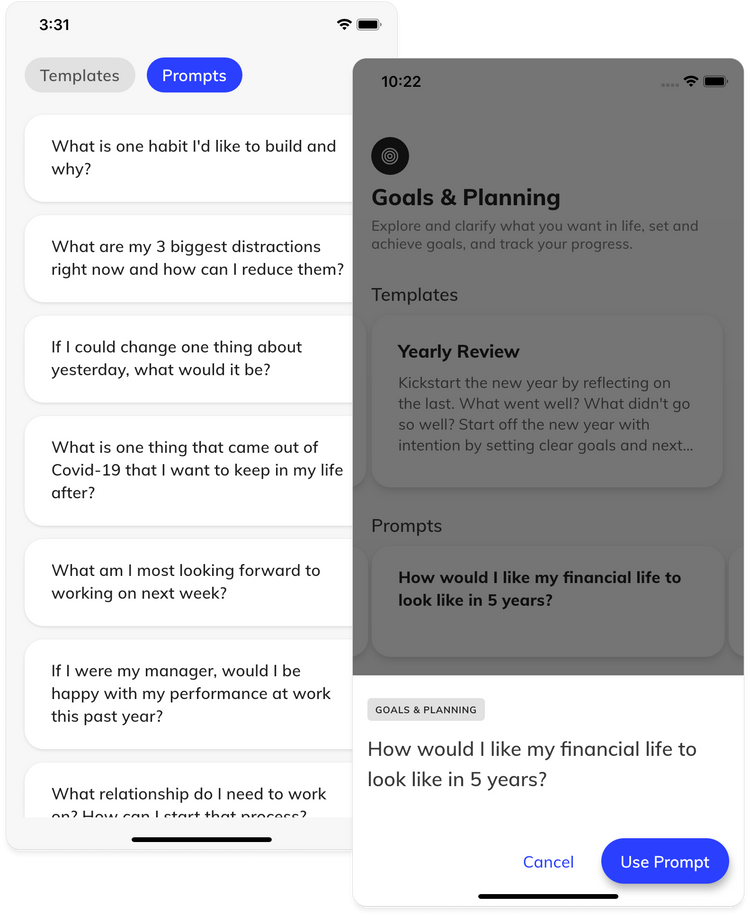
Discover more journaling prompts and become your best self with Clearful
Start a digital journal in Clearful to gain clarity and direct your life with intention.
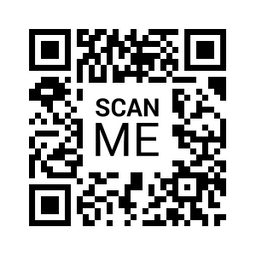
Point phone camera here

IMAGES
VIDEO
COMMENTS
Written by Hannah Blum, author of The Truth About Broken: The Unfixed Version of Self-Love I believe writing is one of the best ways to express yourself, especially when you live with mental illness. However, it's hard to know where to start, which is why I have written creative prompts crafted for those of you living…
This article offers 50 powerful journal prompts for mental health to help you navigate the ups and downs of life with greater clarity and resilience. ... 65 Essential Mental Health Journal Prompts For Adults And Teens. Jess; ... Sometimes the simple physical act of writing can help us to gain clarity and help us unpack our feelings all while ...
The therapeutic benefits of keeping a mental health journal can be endless. Here are 7 therapeutic benefits of keeping a mental health journal [affiliate]. As well as 53 journal prompts that will help get you started, so you hopefully do not find yourself staring at a blank page trying to figure out where to start. Journey Through Journaling ...
The act of systematically channeling emotions through guided writing prompts provides a means of catharsis, allowing for the release of pent-up feelings and facilitating a deeper understanding of oneself. To learn more about the advantages of journaling, check out this article on the Benefits of Journaling for Mental Health.
See which of these mental health journal prompts inspires you and run with it. Answer the same one over and over, looking at it in different ways, or start at the beginning and work towards the end. No matter what you do, journaling is a good place, a safe space, and a good way of improving your mental well-being. List Of Journal Prompts. 1.
46 Journal Prompts for Mental Health The idea of keeping a journal may seem intimidating, but it's easier than you might think. For starters, you don't have to be great with words to journal.
For someone journaling for mental health, prompts ensure that the process remains constructive, leading to insightful revelations and personal growth. They transform journaling into a guided exploration of your inner landscape, making the practice more approachable and rewarding. 150 Journaling Prompts for Mental Health
Unlike typical journaling prompts, mental health prompts delve deeper into personal experiences, promoting a better understanding and improvement of your mental well-being. Categorized journaling prompts help focus on varied life aspects such as stress reduction, gratitude, personal growth, and acceptance, aiding in a holistic approach to ...
46 Journal Prompts for Mental Health. As mentioned, these prompts are intended to help you over the hump of journaling block. If in the middle of tackling one of these mental health prompts you feel the need to change direction, you have our blessing. The idea is that you have an easy, accessible starting point. Whatever happens after that is ...
Explore 144 mental health journal prompts to inspire self-reflection and growth. ... which is why writing as a form of self-expression can be so valuable for those struggling with their mental health. A journal is a great creative outlet for getting your thoughts onto paper (or tablet, computer, etc.). ... Any type of writing is good for ...